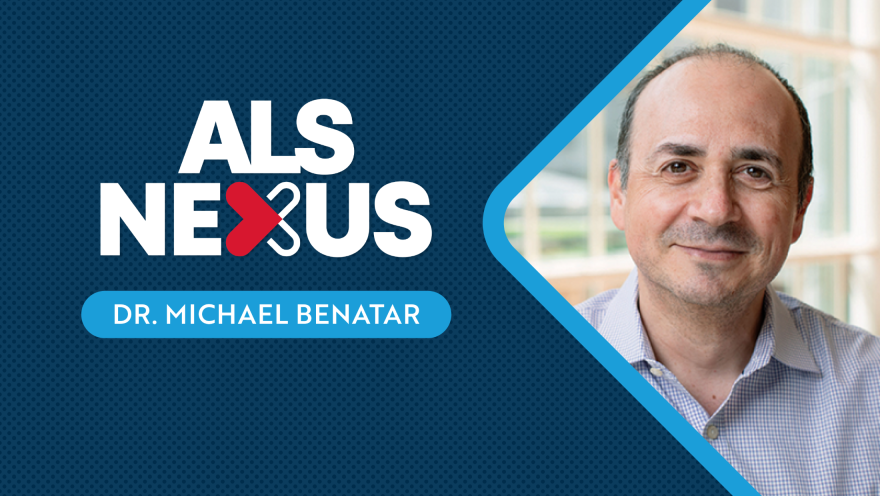Finding new treatments and a cure remains the key part of our mission; however, to truly make ALS a livable disease, advancing the science of prevention is critical. One of the leading researchers working to better understand what is going on at the earliest stages of the disease is Michael Benatar, M.D., Ph.D., a professor of neurology at the University of Miami.
Through his research, he is identifying biomarkers that could be used to predict who is likely to develop ALS and when, as well as helping develop treatments that could potentially delay or prevent the onset of symptoms. And we are thrilled to announce he will be joining us at ALS Nexus in July to talk about this very important work.
Dr. Benatar has devoted his career to unlocking the mysteries of ALS. He obtained his medical degree at the University of Cape Town in South Africa and his doctorate in neuroscience while a Rhodes Scholar at the University of Oxford. After completing his residency and fellowship training at Harvard, he obtained a Master’s in the Science of Clinical Research degree while a faculty member at Emory University.
He currently serves as the Walter Bradley Chair in ALS Research and Executive Director of the ALS Center, one of our Certified Treatment Centers of Excellence™. He is also Chief of the Neuromuscular Division and Vice Chair for Clinical and Translational Research in the Department of Neurology at the University of Miami.

In addition, Dr. Benatar leads the Pre-Symptomatic Familial ALS (Pre-fALS) study, which he initiated in 2007, and the CReATe Consortium, a 35-center network focused on therapy development for ALS and related disorders. He is known internationally for his pioneering work in defining the field of pre-symptomatic ALS, including the discovery of the first biomarker of pre-symptomatic disease (neurofilament light chain or NfL), which has been critical to the design and initiation of the first ALS prevention trial.
He and his colleagues have also identified a phase called mild motor impairment that sits between having no symptoms and receiving an ALS diagnosis. And with support provided by our Prevention Grant Program, Dr. Benatar is working to expand this understanding to sporadic ALS.
"As we discover more biomarkers of presymptomatic disease [there may be] opportunities to intervene in other genetic populations and maybe even in other non-genetic populations,” he said last year during a Connecting ALS Podcast. “Because if we want to get into prevention outside of the genetic realm of disease, we've got to identify those risk factors.
Dr. Benatar, along with a panel of other experts in the field, will explore the current science of prevention, trials involving gene carriers, and the steps we need to take to accelerate this work during our ALS Nexus session, “The Road to Preventing Familial ALS.” We hope you will join us there to connect, collaborate, and change the future of ALS together.
Sign up to receive ALS Nexus updates HERE. To follow the latest ALS research news, sign up for our monthly newsletter, Research Matters.
You can also get stories about people living with ALS in the community and learn more about the disease by subscribing to receive our weekly blogs in your inbox HERE or following us at als.org/blog.
We Want to Hear from You!
Your feedback is important to us. Please let us know what you think about our blog – take this short survey and provide your input and feedback.
In the search to find ways to slow, stop or reverse the progression of ALS, the primary aim of research has been to better understand the disease and develop new drugs. Finding new treatments and a cure remains the mission of the ALS Association; however, to truly make ALS a livable disease, advancing the science of prevention is critical.


Comments
My maternal uncle and my father had ALS. My uncle at age 60 and my father at age 72. I’m very interested in understanding both familial possibilities as well as how to prevent or delay,
We are sorry to hear that, Tonya. There's tons of information on our website regarding familial ALS. We recommend starting on this page: https://www.als.org/understanding-als/who-gets-als/familial.
Hello!
My very best friend was diagnosed with Bulbar ALS in the Fall of 2023. We are from Long Island New York and visited the ALS center in Miami. We also go to the ALS center here in Stonybrook NY. We are looking for a miracle to help slow this beast down. Would love to come to Texas and learn how!!!!!!
Hello Corinne, we'd be happy to have you join us in Texas for ALS Nexus! Please go here to register: https://www.als.org/als-nexus/registration.
Join the conversation. Please comment below.